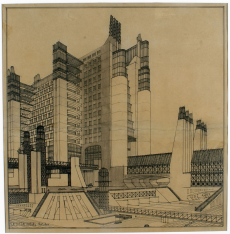
The Manifesto of Futurism, written by the Italian poet and critic Filippo Tommaso Marinetti in 1908 and published in 1909, is a text which came to form the basis of a dynamic and influential new cultural movement, unsurprisingly called Futurism, in early twentieth century Europe. It is a manifesto which, like many manifestos, espoused some controversial views and sought to rebel against tradition and the establishment of Europe.
At the start of the manifesto, however, Marinetti doesn’t begin by making grand sweeping statements like in other more overtly political manifestos, like Karl Marx and Frederick Engel’s famous Communist Manifesto. It begins with Marinetti describing a night out in an Italian town or city with some of his friends, who also appear to have been writers. Yet the way in which he narrates this section gives us a clue as to how Marinetti and his fellow Futurist comrades saw the world.
He illustrates how while he and his friends were “listening to the tedious, mumbled prayers of an ancient canal […] we caught the sudden roar of ravening motorcars, right there beneath our windows.” In this passage we see a clear contrast from how they regard the sound of the slow-moving water of an old canal (boring) to how they regard the sound of the cutting-edge technology of the car (exciting), depicting the former as a “mumbled prayer”, the latter as a “roar” – as if the car is a sort of man-made beast. They appear to love the modern and strongly dislike the old-fashioned.
Marinetti then tells us that, after having gotten in to one of these cars (surprisingly, he doesn’t tell us whether he actually owned the car or not) and crashed it in a ditch, he dictated the eleven articles of the manifesto on the spot, which he then proceeds to repeat in writing.
In these articles, he sets out what could be argued to be a major rethinking of what literature and art should be about. In article three, for instance, Marinetti states, “Up to now, literature has extolled a contemplative stillness, rapture and reverie. We intend to glorify aggressive action, a restive wakefulness, life at the double, the slap and the punching face.” He suggests that literature should be moved away from being something passive and meditative and instead become louder, more intense, more outspoken and violent in its use of language. This radically new outlook on literature then leads onto Marinetti declaring in article seven that “Any work of art that lacks a sense of aggression can never be a masterpiece.”
Also, in some of the articles, Marinetti tells of us the political outlook of his artistic movement. In article nine, he writes, “We wish to glorify war” on the basis that it is “the sole cleanser of the world”, as well as (and here he doesn’t provide a reason) “scorn for women”. Added to this, he states in article ten that “We wish to destroy museums, libraries, academies of any sort and fight against moralism [and] feminism”. In his manifesto, Marinetti therefore puts forward a radical political outlook to match its radical view of the arts; one which is militaristic, anti-women, amoral and seeks to destroy all record of the past, due to its detesting of the old and obsession with the new; always wishing to look forwards and never backwards.
In this way, the Manifesto of Futurism by Filippo Tommaso Marinetti seems to the reader of today to be very much a precursor to fascism in its aggressiveness, arrogance and absolutism.
Image: Antonio Sant'Elia [Public domain], via Wikimedia Commons

0 Comment:
Be the first one to comment on this article.